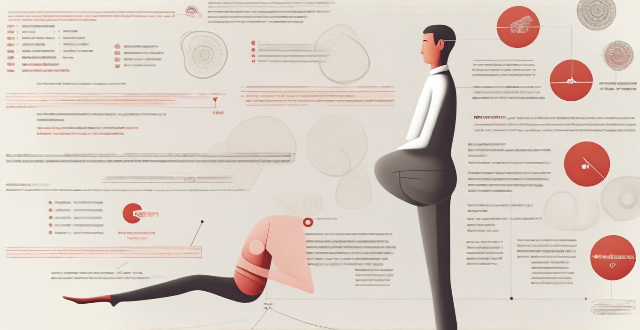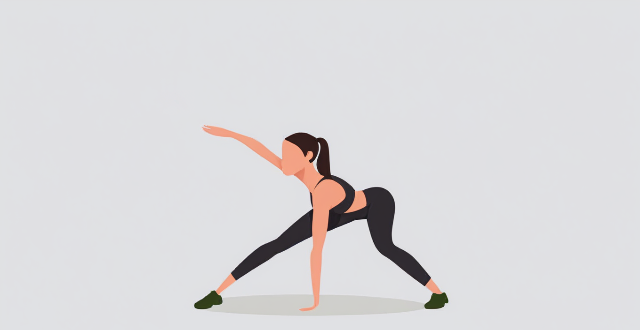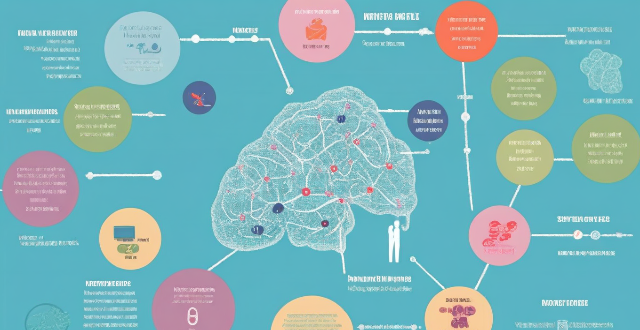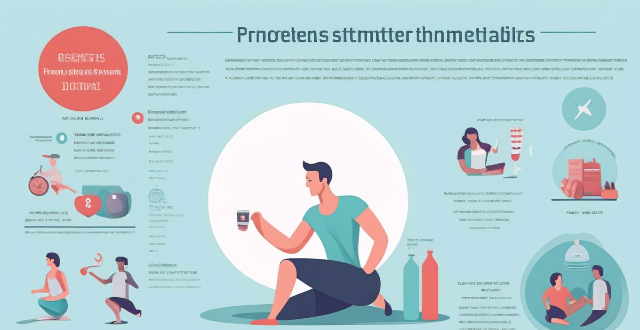Activity Stress

Can regular physical activity help in reducing stress and anxiety ?
Regular physical activity can help reduce stress and anxiety by promoting the release of endorphins, improving sleep quality, and boosting self-esteem. Aerobic exercises like running, swimming, or cycling are particularly effective because they increase heart rate and circulation, leading to improved oxygenation of the brain. Yoga and tai chi focus on breathing and relaxation techniques that can also help reduce stress and anxiety. The American Heart Association recommends at least 150 minutes of moderate-intensity aerobic exercise or 75 minutes of vigorous-intensity aerobic exercise per week for adults. Finding an exercise routine that works for you and that you enjoy is key to sticking with it over time.

Can physical activity improve mental health ?
Physical activity has been found to significantly improve mental health by enhancing self-efficacy and stress self-management skills. Research shows that engaging in physical activities can lead to a sense of accomplishment, boosting an individual's confidence in their abilities, which in turn fosters better stress management and contributes to enhanced mental well-being. This relationship is particularly important for adolescents, a demographic vulnerable to mental health challenges. Future research should focus on identifying specific types of physical activities that have a greater potential to enhance these skills, guiding the development of targeted interventions aimed at improving mental health through physical activity.

Does regular physical activity prevent burnout ?
Regular physical activity can help prevent burnout by boosting mood, reducing stress, improving sleep quality, enhancing cognitive function, and promoting social interaction. However, it should be part of a broader approach to managing stress and preventing burnout.

How much exercise do I need to do to manage my stress effectively ?
Managing stress through exercise is a crucial aspect of maintaining overall health and well-being. The ideal amount of exercise for stress management, as per the American Heart Association, is 150 minutes of moderate-intensity aerobic activity or 75 minutes of vigorous aerobic activity weekly, along with muscle-strengthening activities involving all major muscle groups at least twice a week. Different types of exercises such as aerobic exercises, strength training, flexibility exercises, and mind-body exercises can contribute to stress relief. When creating an exercise routine, it's important to start slow, choose enjoyable activities, mix up different types of exercises, set realistic goals, and make it a habit. Consistency is key in managing stress through exercise.

How does meditation help in reducing stress levels ?
Meditation is a practice that helps in reducing stress levels by calming the mind and body, improving concentration, promoting emotional health, increasing self-awareness, and enhancing mindfulness. It is a powerful tool for managing stress effectively and leading a happier, healthier life.

Can stress impact a woman's ability to conceive ?
The text discusses the potential impact of stress on a woman's ability to conceive, detailing how stress can lead to hormonal imbalances that affect menstrual cycles and ovulation, decreased sex drive, impaired egg quality, and difficulty maintaining pregnancy. It also provides coping strategies such as mind-body techniques, exercise, building a support system, and making lifestyle changes to manage stress levels and potentially improve fertility.

Is yoga an effective method for stress relief ?
Yoga is a popular method for stress relief, offering physical, mental, and emotional benefits. Research supports its effectiveness, and incorporating yoga into your routine can significantly reduce stress levels. Consistency and personalization are key to experiencing its full benefits.

Can exercise help with stress management ?
**Topic:** Can Exercise Help with Stress Management? **Summary:** * **Introduction:** The inevitability of stress and its potential impact on health highlight the importance of effective stress management. Exercise is often touted as a beneficial method for reducing stress. * **Relationship Between Exercise and Stress:** * **Physical Effects:** Exercise triggers endorphins, reduces cortisol levels, and improves sleep quality—all of which contribute to stress reduction. * **Mental Effects:** Enhanced cognitive function, increased self-esteem, and mindfulness techniques associated with exercise can aid in stress management. * **Benefits of Exercise for Stress Management:** * **Physical Benefits:** Improved cardiovascular health, weight management, and pain relief can reduce stress caused by related health issues. * **Mental Benefits:** Exercise can alleviate symptoms of anxiety and depression, improve mood, and increase resilience to stress. * **Practical Tips:** * **Setting Goals:** Start small and choose enjoyable activities to make exercise a sustainable habit. * **Consistency:** Scheduling workouts, finding an accountability partner, and tracking progress can help maintain a regular exercise routine. * **Conclusion:** Exercise is a powerful tool for managing stress, offering both physical and mental benefits. Incorporating it into one's lifestyle can significantly enhance overall well-being and resilience to life's challenges.

Can regular physical activity reduce anxiety levels ?
Regular physical activity can help reduce anxiety levels by improving mood, reducing stress hormones, promoting better sleep, increasing self-esteem and confidence, and providing social support. Engaging in at least 30 minutes of moderate-intensity exercise per day can significantly reduce anxiety symptoms.

Can regular physical activity improve mental health ?
Regular physical activity can improve mental health by reducing the risk of depression and anxiety, enhancing self-esteem and cognitive function, improving sleep quality, and reducing stress. Practical recommendations for incorporating exercise into daily routines include starting small, finding enjoyable activities, setting realistic goals, making it social, incorporating strength training, staying consistent, listening to your body, and consulting with professionals.

How does physical activity affect children's cognitive development ?
This article discusses the positive impacts of physical activity on children's cognitive development, including improved attention and memory, enhanced executive functioning, increased learning abilities, reduced stress and anxiety, and promoted socialization and teamwork skills. Regular exercise can enhance blood flow to the brain, strengthen neural connections in the prefrontal cortex, stimulate neurogenesis, release endorphins, and provide a healthy outlet for releasing energy and emotions. Encouraging children to engage in regular physical activity can have long-lasting positive effects on their overall well-being and success throughout life.

How does exercise help in managing stress ?
Stress is an inevitable part of life, but regular exercise can help manage it effectively. Exercise releases endorphins, reduces muscle tension, improves sleep quality, boosts self-esteem and confidence, provides a sense of accomplishment, and promotes social interaction. To incorporate exercise into your daily routine, start slowly, find an activity you enjoy, make it a part of your routine, mix up your routine, and don't overexert yourself. By doing so, you can reap the numerous benefits of exercise for stress management and overall well-being.

How to choose the right extracurricular activity for your child ?
Choosing the right extracurricular activity for your child is crucial for their development and well-being. Consider your child's interests, skills, and abilities, evaluate the time commitment and logistics, seek recommendations and read reviews, and involve your child in the decision-making process to help them choose an activity they will enjoy and benefit from.

Can regular physical activity prevent age-related diseases ?
The text discusses the potential of regular physical activity to prevent age-related diseases, highlighting its numerous benefits such as improved cardiovascular health, enhanced immune function, better bone density, reduced inflammation, and improved mental health. It further elaborates on how these benefits can specifically prevent or delay the onset of diseases like cardiovascular diseases, diabetes, osteoporosis, cancer, and dementia. The conclusion emphasizes that while regular physical activity can play a significant role in preventing age-related diseases, it should be part of a comprehensive approach to health that also includes a balanced diet, adequate sleep, and stress management.

What are the best stress-relieving sports ?
Stress is a common problem that affects people of all ages and backgrounds. Fortunately, there are many sports that can help relieve stress and improve overall well-being. Some of the best stress-relieving sports include yoga, swimming, running, cycling, and boxing. Yoga combines physical activity with relaxation techniques and involves various postures, breathing exercises, and meditation. Swimming provides a full-body workout and has a calming effect on the mind. Running releases tension and boosts endorphins, while cycling is a fun and exciting way to get active. Boxing may seem like an unlikely choice for stress relief, but it can actually be very therapeutic. Incorporating these sports into your routine can help you manage stress and improve your overall health and well-being. Remember to listen to your body and start slowly if you're new to any of these activities. With consistent practice, you'll soon reap the benefits of these stress-relieving sports.

How does exercising regularly impact stress levels and overall mood ?
This text discusses the impact of regular exercise on stress levels and overall mood. It highlights how physical activity can help reduce stress by releasing endorphins, regulating cortisol levels, improving self-esteem, and providing distraction from worries. Additionally, it explains how exercise enhances mood through immediate effects like increased energy and a feeling of achievement, as well as long-term outcomes such as better sleep and social interaction. The text concludes that regular exercise has a profound impact on mental well-being, promoting both looking good and feeling good.

Can exercise physiology help in managing stress and anxiety levels ?
Exercise physiology plays a significant role in managing stress and anxiety levels by promoting various physiological responses that counteract the negative effects of these conditions on the body. By incorporating regular physical activity into your lifestyle, you can improve your overall mental well-being and reduce the impact of stress and anxiety on your daily life.

How does exercise influence cortisol levels, which are associated with stress ?
Exercise has a complex relationship with cortisol levels and stress management. Acute exercise can cause a temporary increase in cortisol levels, while chronic exercise can help regulate them over time. By managing stress through regular physical activity, individuals can maintain healthy cortisol levels and improve their overall well-being. Chronic stress and persistently high cortisol levels can contribute to a range of health problems, including weight gain, high blood pressure, impaired immune function, decreased bone density, increased risk of heart disease and stroke, and mood disorders such as anxiety and depression. Regular exercise can help manage stress and maintain healthy cortisol levels by improving mood and mental health, better sleep quality, and increased resilience to stress.

What role does stress play in sleep disturbances and how can it be managed ?
Stress can significantly impact sleep quality by causing difficulty falling asleep, frequent awakenings, light sleep, and early morning awakenings. Managing stress through relaxation techniques, regular exercise, healthy eating habits, a consistent bedtime routine, a comfortable sleep environment, limited screen time, and seeking professional help when needed can improve sleep quality and overall well-being.

What is the relationship between physical activity, mental health, and peace ?
The text discusses the interconnected relationship between physical activity, mental health, and peace. Regular physical activity can reduce anxiety and depression, improve mood, and enhance cognitive function, which in turn fosters emotional stability, clear thinking, and empathy - qualities necessary for maintaining peace. Sports and group activities promote teamwork, respect for others, and community building, contributing to peaceful interactions. Therefore, understanding these connections can lead to conscious choices that improve individual lives and contribute to a more peaceful world.

How does stress management through exercise impact professional well-being ?
The impact of stress management through exercise on professional well-being is significant and positive. Professional well-being refers to overall satisfaction and happiness in the workplace, which includes job satisfaction, work-life balance, relationships with colleagues, and personal growth opportunities. Exercise is a proven method for managing stress, as it releases endorphins and reduces levels of stress hormones like cortisol and adrenaline. Regular physical activity also promotes better sleep, essential for stress management. The impact of exercise on professional well-being includes improved mental health, enhanced cognitive function, increased energy levels, better work-life balance, and improved interpersonal relationships at work. By incorporating regular physical activity into our daily routine, we can achieve these benefits, leading to increased productivity, reduced absenteeism, and improved job performance. Therefore, organizations should promote exercise among their employees as part of their overall wellness program.

Can team sports help in building stronger personal connections and reducing stress ?
Team sports can help in building stronger personal connections and reducing stress by enhancing social interactions, developing communication skills, fostering empathy and understanding, promoting physical activity, providing a distraction from stressful situations, and promoting mindfulness.

Can regular physical activity prevent depression ?
Regular physical activity can reduce depression risk by releasing endorphins, improving sleep, and boosting self-esteem. Start with 30 minutes daily of activities like walking or swimming, and consider joining a fitness class for motivation. Gradually increase intensity and listen to your body to avoid overexertion.

What are the benefits of physical activity on brain health ?
Physical activity has numerous benefits for brain health, includingPhysical activity has numerous benefits for brain health, including risk of dementia, including improved cognitive function, reduced risk of dementia, and increased overall brain volume. Regular exercise increases blood flow to the brain, delivering nutrients and oxygen to neurons, reducing inflammation and oxidative stress, and enhancing neural plasticity through increased levels of BDNF. Additionally, physical activity improves mood, reduces symptoms of depression and anxiety, and improves sleep quality. Incorporating regular exercise into your lifestyle can help maintain a healthy mind and body.

How can stress management contribute to better personal health ?
Stress management is crucial for maintaining physical and mental health, as it can reduce the risk of chronic diseases, improve sleep quality, boost the immune system, reduce anxiety and depression symptoms, enhance cognitive function, and increase resilience. Incorporating stress management techniques into daily routines can lead to better overall well-being and a higher quality of life.

How does team sports impact psychological well-being ?
Participating in team sports can have a significant impact on an individual's psychological well-being. Team sports provide opportunities for social interaction, physical activity, and personal growth, all of which contribute to overall mental health. Social interaction reduces feelings of loneliness and isolation, while physical activity improves mood and reduces symptoms of anxiety and depression. Personal growth through learning new skills or overcoming challenges builds resilience and confidence. Team sports also provide a healthy outlet for stress relief and require discipline and time management skills that can translate into other areas of life. Overall, participating in team sports can improve mental health and quality of life.

Is high-intensity interval training (HIIT) beneficial for reducing stress ?
The text discusses the potential benefits of High-Intensity Interval Training (HIIT) for stress reduction, including releasing endorphins, improving cardiovascular health, boosting self-confidence, enhancing focus and concentration, and providing a sense of accomplishment. It also provides tips for incorporating HIIT into a routine, such as starting slowly, choosing enjoyable activities, setting realistic goals, incorporating recovery time, and seeking professional guidance.

How can I reduce stress in my daily life ?
The article provides several tips on how to reduce stress in daily life, including identifying the sources of stress, practicing mindfulness and meditation, exercising regularly, eating a healthy diet, getting enough sleep, and connecting with others. It emphasizes the importance of taking steps to manage stress and improve overall well-being.

How do health management apps help individuals manage stress and improve mental wellbeing ?
Health management apps offer various features to help individuals manage stress and improve their mental wellbeing, including mindfulness exercises, sleep tracking, physical activity tracking, nutritional guidance, social support, relaxation techniques, goal setting, and educational content.

Is there a link between physical activity and improved creativity ?
The text discusses the potential relationship between physical activity and creativity, highlighting various studies and theories that support this link. It suggests that regular physical exercise can enhance creativity by improving blood flow to the brain, promoting a relaxed mental state, and providing necessary breaks from mentally demanding tasks. The text also explores practical implications for individuals and organizations, suggesting strategies such as integrating movement into daily routines and designing active workspaces to boost creative thinking. Overall, while more research is needed to fully understand the relationship between physical activity and creativity, the text encourages incorporating physical activities into daily practices to potentially enhance imaginative thinking and innovation.